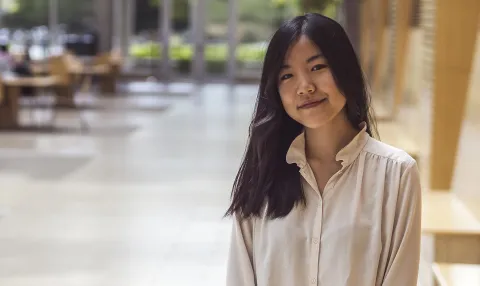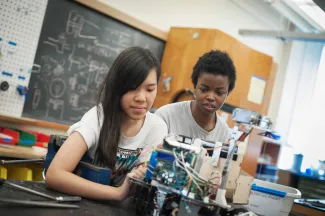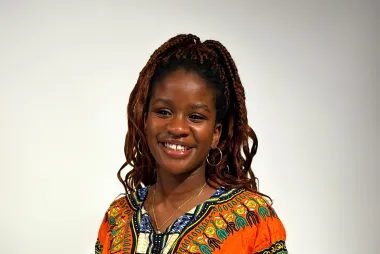"The most important things I have learned during my degree are not necessarily the technical details of the courses I have taken, but rather the underlying ability to pick up new skills and build on existing ones."

Yuqing Du
- Degree:
- Bachelor of Applied Science
- Grad year: 2019
- Program:
- Campus: Vancouver
I am graduating from Engineering Physics with a Minor in Honours Mathematics. During my degree, I was fortunate enough to have the opportunity to explore a variety of different engineering fields. At UBC I worked on multiple student teams — ranging from genetic to automotive engineering — and worked as a research assistant at the UBC Collaborative Advanced Robotics and Intelligent Systems (CARIS) Lab on human-robot interaction research. During co-op terms, I worked in both hardware and software engineering roles at Google and Tesla in Silicon Valley, which not only allowed me to meet some incredible individuals at the forefront of technology, but also solidified my interest in robotics as a fascinating intersection between hardware, software and cognitive science. Ultimately, I am incredibly thankful for the network of inspiring peers that Engineering Physics has provided me and have been lucky enough to give back to this community as a mentor and teaching assistant.
What has made your time at UBC the most memorable?
The amazing communities I have been a part of; the engineering physics community has been a central part of my life for the last four years. I will never cease to be motivated and inspired by the close friends I have made. Furthermore, in participating in different interdisciplinary engineering student teams, I have made some great memories working with and learning from other UBC engineering students that I would never have met otherwise. I can confidently attribute many of my accomplishments to the supportive network of friends I have found at UBC.
What have you learned in engineering that is most valuable?
Throughout my experiences in engineering — whether it be as an engineering intern in industry, on a student-lead engineering team, or working on a capstone project — I have learned that the ability to collaborate effectively in a team environment is critical in being a successful engineer. I think that engineers across different disciplines can all benefit from being able to effectively convey ideas and being receptive to new ideas. People can approach the same problem from different perspectives I have found that it is always worth listening to what others have to say. Outside of engineering specifically, I have also learned that maintaining a good work-life balance is incredibly valuable. While it can be easy to get suckered into an endless cycle of assignments, projects exams during undergrad, I was able to avoid getting burnt out by making personal time for things like social events, painting or even just enjoying a long walk.
How do you feel a degree in engineering has benefitted you compared to a different field of study?
I think working towards a degree in engineering has helped me develop a combination of problem solving and design skills. The most important things I have learned during my degree are not necessarily the technical details of the courses I have taken, but rather the underlying ability to pick up new skills and build on existing ones. Being a part of Engineering Physics has taught me how to effectively break down problems from a variety of different fields, and I feel well-prepared to tackle any engineering problems my future may bring.
What advice would you give a student considering engineering?
Upon beginning my engineering degree, the fact that I did not have a specific engineering career goal in mind worried me. Many of my friends had well-defined passions and interests, and all I really knew for certain was that I wanted to make an impact with my work, and I wanted to solve problems that I found interesting. If I could give advice to my past self, I would say that it’s perfectly okay to not know exactly what field you want to be in, and to jump between vastly different career goals. My time at UBC provided an incredible opportunity to explore different fields, whether it be through taking technical electives, joining student teams, or pursuing different co-op jobs. These experiences have helped me find where my passions truly lie all I had to do was keep an open mind and take some initiative to explore.
Where do you find your inspiration?
I am inspired by my peers, and the fact that each of them has a passion for some area of STEM, be it electrical or mechanical engineering, physics, computer science or mathematics. Being surrounded by passionate and driven individuals has been incredibly motivating I am thankful for the wide range of fields I have been exposed to during my degree. The people that have surrounded me at UBC have truly pushed me to be the best version of myself.
What are your plans for the future?
My immediate plans for this summer are to make some amazing memories travelling throughout Asia with my long-time friends and family. Afterwards, I will be starting as a computer science PhD student at the University of California, Berkeley. In particular, I will be joining the Berkeley Artificial Intelligence Research (BAIR) Lab, where I hope to work on problems surrounding robot learning and human-robot interaction research.



